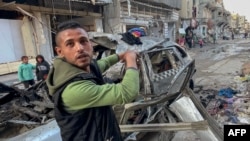Israel said Wednesday it killed three sons of Hamas' supreme leader Ismail Haniyeh in an airstrike in Gaza, saying all the siblings belonged to the militant group's armed wing.
Four of Haniyeh's grandchildren also were killed in the attack as Hazem, Ameer and Mohammed Haniyeh were driving with the children near the Shati refugee camp in Gaza City. Ismail Haniyeh is originally from Shati.
Haniyeh, who lives in exile in Qatar, heard of the news while visiting wounded Palestinians who had been transported to a hospital in Doha. He confirmed the deaths in an interview with the Al Jazeera satellite channel, saying his sons "were martyred on the road to liberating Jerusalem and the Al-Aqsa Mosque."
"The criminal enemy is driven by the spirit of revenge and murder and does not value any standards or laws," Haniyeh said.
His sons are among the highest-profile figures to be killed so far in the six-month Israeli-Hamas war in Gaza. The Israeli military described the three siblings as a cell commander and two military operatives.
The brothers were traveling with family members in a single vehicle targeted by an Israeli drone, Al-Aqsa TV said.
“All the people of Gaza have paid a high price,” the Hamas leader said. “I am one of them.”
It was not immediately clear how the deaths of Haniyeh’s sons and grandchildren might affect the monthslong cease-fire talks being brokered by international mediators, but Haniyeh said Hamas would not cave in to pressure.
"The enemy believes that by targeting the families of the leaders, it will push them to give up the demands of our people," he said. "Anyone who believes that targeting my sons will push Hamas to change its position is delusional."
Hamas said Tuesday it was studying an Israeli cease-fire proposal but that it was "intransigent.” Hamas has demanded that Israel withdraw all its troops from Gaza and end the war, which Israel has rejected.
Negotiations for a more limited cease-fire have extended for weeks without resolution. The U.S. pushed Hamas on Tuesday to accept terms for a six-week halt in the fighting, along with a return of some of the 100 or so hostages Hamas is holding in tunnels in Gaza in exchange for the release of several hundred Palestinians jailed in Israel.
Biden criticizes approach to war
Meanwhile, U.S. President Joe Biden said in an interview aired late Tuesday that he does not agree with Israeli Prime Minister Benjamin Netanyahu’s approach to Israel’s war against Hamas, and that Israel should call for a halt in fighting to facilitate humanitarian aid deliveries.
The Spanish-language network Univision interviewed Biden on April 3, two days after an Israeli attack killed seven staff members from the aid group World Central Kitchen in Gaza.
Biden said there is no excuse for not providing food and medical aid to the people of Gaza, and that those efforts “should be done now.”
“What I'm calling for is for the Israelis to just call for a cease-fire, allow for the next six, eight weeks total access to all food and medicine going into the country,” Biden said. “I've spoken with everyone from the Saudis to the Jordanians to the Egyptians. They're prepared to move in. They're prepared to move this food in.”
The White House said last week that Biden made similar points when he spoke with Netanyahu in a phone call, emphasizing that the humanitarian situation in Gaza is “unacceptable.”
Meanwhile, British Foreign Minister David Cameron said Tuesday that his country will not block arms sales by British companies to Israel.
"The latest assessment leaves our position on export licenses unchanged," Cameron said in Washington.
"Let me be clear, though,” he added, “we continue to have grave concerns around the humanitarian access issue in Gaza."
Israel declared war on Hamas after the October 7 Hamas terror attack on Israel that killed 1,200 people and led to the capture of about 250 hostages. Israel’s subsequent counteroffensive in Gaza has killed more than 33,000 people, about two-thirds of them women and children, according to the Hamas-run Gaza health ministry.
U.S. Secretary of State Antony Blinken said Tuesday the war could have ended months ago if Hamas “had put down its guns, stopped hiding behind civilians and surrendered.”
The top U.S. diplomat said Biden has “been very clear about our concerns, our deep concerns about Israel's ability to move civilians out of out of harm's way to care for them” in the event of an Israeli attack on the southern city of Rafah.
Blinken said he does not see anything imminent happening in Rafah and that he does not believe anything will occur before U.S. and Israeli officials meet next week.
The U.S. opposes the planned Rafah attack, with White House officials saying the Israelis have not shared an attack date with Washington.
Netanyahu said Monday an undisclosed date has been set for Israel’s military to invade Rafah on the Gaza-Egyptian border, a region where more than a million Palestinians are sheltering to try to remain safe. Netanyahu says an Israeli offensive is necessary to win its war against Hamas.
U.S. Defense Secretary Lloyd Austin told a Senate hearing Tuesday that a deadly famine in Gaza would likely accelerate violence and ensure a long-term conflict. The U.S. has continually pressed Israel to allow more humanitarian aid into Gaza to feed famished Palestinians.
Some international critics have contended that Israel is committing genocide with indiscriminate attacks on Palestinians in Gaza, taking little care for their safety as it hunts down Hamas militants.
But Austin dismissed the contention, saying, "We don't have evidence of that."
Jeff Seldin contributed to this report. Some information for this report was provided by Reuters, The Associated Press and Agence France-Presse.







